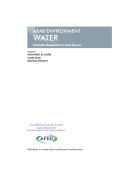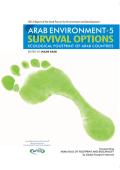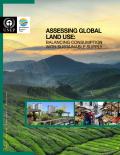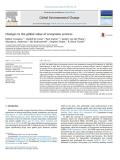
This report is designed to contribute to the discourse on the sustainable management of water resources in the Arab world and provides critical understanding of water in the region without being overly technical or academic in the nature. The unifying theme is presenting reforms in policies and management to develop a sustainable water sector in Arab countries. Case studies, with stories of successes and failures, are highlighted to disseminate learning. The report contributes to the ongoing dialogue on the future of water and catalyses institutional reforms leading to determined action for sustainable water policies in Arab countries.

The environmental and health sciences have brought important insights into the connection of environmental pressures and ecosystem damages. Well-known assessments show that habitat change, the overexploitation of renewable resources, climate change, and particulate matter emissions are amongst the most important environmental problems. Biodiversity losses and ill health have been estimated and evaluated.
This report focuses not on the effects of environmental pressure, but on its causes. It describes pressures as resulting from economic activities. These activities are pursued for a purpose, to satisfy consumption. Environmental pressures are commonly tied to the extraction and transformation of materials and energy. This report investigates the production-materials-consumption nexus.

Global land use plays a central role in determining our food, material and energy supply. Many countries have started to support the use of biomass for biofuels and biomaterials, and, at the same time, are becoming concerned about the increasing consequences of land competition, such as rising food prices, land use change, and land use intensification. Cropland expansion at the cost of tropical forests and savannahs induces severe changes in the living environment with uncertain repercussions. A central question is, thus, to what extent can global cropland expand to serve the growing demand for food and non-food biomass, while keeping the consequences of land use change, such as losses of biodiversity, at a tolerable level?

In 1997, the global value of ecosystem services was estimated to average US$33 trillion/yr in 1995 US$ (US$46 trillion/yr in 2007 US$). In this paper, we provide an updated estimate based on updated unit ecosystem service values and land use change estimates between 1997 and 2011. We also address some of the critiques of the 1997 paper. Using the same methods as in the 1997 paper but with updated data, the estimate for the total global ecosystem services in 2011 is US$125 trillion/yr (assuming updated unit values and changes to biome areas) and US$145 trillion/yr (assuming only unit values changed), both in 2007 US$. From this we estimated the loss of eco-services from 1997 to 2011 due to land use change at US$4.3–20.2 trillion/yr, depending on which unit values are used. Global estimates expressed in monetary accounting units, such as this, are useful to highlight the magnitude of eco-services, but have no specific decision-making context. However, the underlying data and models can be applied at multiple scales to assess changes resulting from various scenarios and policies.
The strengthening of the link between environment and economy is a key challenge faced by the Arab countries. By integrating the environment into the economic policy and working towards green growth at a national and regional level, Arab countries will be able to progress in economic growth, jobs creation, social equity and sustainability of natural resources. This paper endeavors to deepen this argumentation, and highlights both the benefits that could be reaped by Arab countries and the priorities in the implementation of a green growth strategy.
The concept of the Sustainable Future was generated in global dialogues; more recently, it has started to transfer to policy making. The paper seeks to discuss how foresight is used to understand the implications of global changes, focusing on the role of green economy strategies in fostering societal, economic progress and environmental conservation. In particular, the use of green economy indicators is reviewed, focusing on the measuring frameworks proposed by different organizations. Finally, an integrated approach is proposed to carry out a systemic and cross-sectoral assessment of key policy instruments aimed at facilitating the transition to a more sustainable future.
This report maps existing and emerging carbon pricing initiatives around the world. It does not provide a quantitative, transaction-based analysis of the international carbon market since current market conditions invalidate any attempt to undertake such an analysis. The development of national and subnational carbon pricing initiatives in an increasing number of countries calls for a different focus. The uncertainty surrounding the existing carbon markets in the last years has prevented valuable resources to be channeled to low-carbon investments, particularly from the private sector. Following the economic downturn and slow economic recovery in major economies, industrial output plummeted and the demand for carbon assets used for compliance fell. With limited support, prices reached historical lows. At the same time, several national and sub-national carbon pricing initiatives are emerging. It is not surprising that several of these new carbon pricing initiatives also include design features to prevent similar developments in the future, including mechanisms to stabilize the carbon price.
The Fifth Assessment Report from the Intergovernmental Panel on Climate Change is the most up-to-date, comprehensive and relevant analysis of our changing climate. Urban centres account for more than half of the world's population, most of its economic activity and the majority of energy-related emissions. This briefing explores the roles cities will play in the fight against climate change.
Public policy sets the rules of the game. Public policy critically affects the ability of long-term investors to generate sustainable returns and create value. Public policy also affects the sustainability and stability of financial markets, as well as social, environmental and economic systems.
Policy engagement by long-term investors is, therefore, a natural and necessary extension of an investor’s responsibilities and fiduciary duties to the interests of beneficiaries.
The importance of public policy for long-term investors has grown in recent years, due to factors such as legislative reform of the financial sector in the wake of the global financial crisis, governmental need for investors as a source of long-term finance, and the increasing impact of environmental, social and governance factors on the ability of investors to deliver long-term returns.
